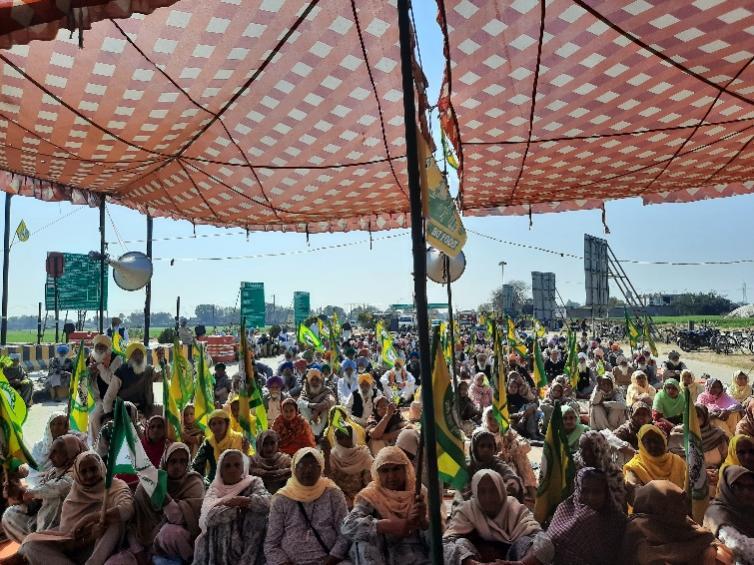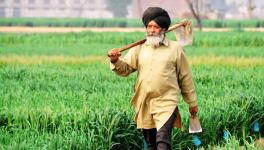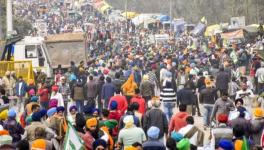‘Punjab will Keep the Movement Alive’: The Workforce Behind Protests on Delhi Borders

Protest at Jeeda Toll Plaza.
Charanjeet Kaur, 40, is preparing to visit Delhi’s Tikri border from Wara Bhaika village in Punjab’s Faridkot district for the third time next week. This time, Kaur and her husband, Devinder Singh, along with few neighbourhood men and women will visit the agitation site with milk, flour and vegetables.
“Milk is something that finishes quickly, considering that Punjab is very fond of Lassi (buttermilk) and chai (tea). They would skip a meal but never a glass of Lassi,” Kaur laughs while giving the reporter a cup of tea.
Last time, when Kaur visited Delhi borders in January with her 13 year-old son, she carried 60 litres of milk and wood. Kaur says, “Every time a group leaves for Delhi, villagers contribute for essentials as per the requirement, including milk, vegetables, flour, and rice.”
“Each household contributes in whatever capacity they can, and they do that willingly as they all are against these farm laws,” she adds.
Kaur’s entire family, including her 17-year-old daughter, 13-year-old son, and her aged father-in-law, have visited Delhi borders in different batches in support of the ongoing farmers protest against the three contentious farm laws.
When farm laws were passed last year in September, Kaur was among many other women who visited towns and villages in tractors and trolleys to mobilise public opinion on the legislation. “We educated women about the laws and how farmers will be affected,” Kaur says.
After the movement gained pace on the borders, Kaur made sure that farmers from her village are well equipped to brave the harsh capital winters with regular supply of food and blankets. “We are in regular contact with the farmers protesting at the borders and when they are in need of something, they let us know and we send it from here.”
Kaur says that to maintain the movement at the Delhi borders, entire Punjab is at work. “We keep supplying them with essentials, so they are never short of anything. Punjab is making sure that the agitation survives at the borders,” she says.
NewsClick met Kaur around 4.4 kilometres from her village on Bathinda-Amritsar highway at Jeeda toll plaza, where she has joined hundred other farmers – male and female, old and young – to block the plaza in protest against the “Kaale Kanoon” (black laws).
Kaur is joined by Karamjeet Dhillon, a woman in her late 60s, who has recently returned from Tikri border. Dhillon regularly visits the toll plaza protest site and encourages other women to drop household chores to join the vigil daily.
Dhillon says that for every ten who return, double farmers—men and women-- are leaving from Punjab. “Here everyone is related to farming in one way or other. So even if it takes two years till the Modi government falls, Punjab is capable of keeping the movement alive at the borders.”
Pointing at the Apex Court’s recent suggestion that women, elderly farmers and children should return home, Dhillon terms it as a “conspiracy,” saying, women are equal stakeholders and won’t budge. “They want to send us (women) back home so that they can beat our men and label this movement as ‘violent’ as they cannot do that with women.”
While the movement at Delhi-Haryana-Uttar Pradesh borders has gained spotlight, farmers in Punjab are maintaining the ongoing agitation by blocking different sites including toll plazas, businesses like Best Price, malls owned by Mukesh Ambani and Gautam Adani, and petrol pumps run by Reliance, since October last year. Everyday, they gather in hundreds to observe sit-ins at these protest sites across Punjab from 11 am to 5 pm to press for their demands with regular supply of tea and langar.
At Jeeda toll plaza which NewsClick visited, the protesters have blocked the toll plaza preventing the collection of toll from commuters. However, they were letting vehicles pass without any payment at the plazas.
“See, the traffic is moving. Our intention is to affect the income of these plazas not the ordinary people,” said Hardev Singh, aged 70, one of the protesters and member of the All India Kisan Sabha (AIKS) while pointing at the vehicles passing from the last two lanes of the Plaza.
NewsClick also visited Bathinda in the Malwa region and learned that out of 268 villages in the district, every day, a batch of farmers leave from each village via train, buses, motor cycles and tractors, with supplies, to stay for a minimum of seven to 10 days at the protests until another batch joins. Singh told NewsClick that the same procedure has been followed by the villages across Majha and Doaba regions.
But as per the protesting farmers, things have changed post January 26 violence, which was followed by news of missing protesters. Reportedly, 100 protesters have gone missing since Republic Day tractor rally, following which the Punjab government has set up a helpline number. Meanwhile, The Delhi Police has published a list of 120 people who have been arrested for their alleged involvement in the violence that broke out during the tractor rally organised by the protesting farmers. In response, Chief Amarinder Singh has said that 70 lawyers have been arranged to help farmers booked by the Delhi Police.
While the stream of farmers leaving for Delhi, to join the ongoing protest, has remained unaffected, the village Panchayats and Unions have taken on to themselves to keep a track on those leaving.
Kaur’s husband, Devinder Singh, also known as Mohan, has been associated with the Bharatiya Kisan Union (Ekta Ugrahan) for last 16 years and now heads the union in his village, Wara Bhaika. He says that union leaders have become more vigilant.
“Committees formed in villages are registering contact of each and every individual leaving from Punjab to Delhi. Nobody is allowed to leave without letting the committees know. They are contacted regularly till they reach Delhi and come back. We cannot depend on the government, so we have taken the task onto ourselves,” Singh says.
Singh’s wife Kaur, who is preparing for her next visit to Tikri border, says that Punjab has laboured hard to keep the movement alive and it will do so in the future too. “Even if it takes ten years, we will stay here. We won’t move until farm laws are repealed.”
Get the latest reports & analysis with people's perspective on Protests, movements & deep analytical videos, discussions of the current affairs in your Telegram app. Subscribe to NewsClick's Telegram channel & get Real-Time updates on stories, as they get published on our website.
























